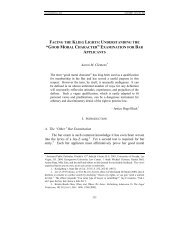The Science and Statistics Behind Spanking Suggests that
The Science and Statistics Behind Spanking Suggests that
The Science and Statistics Behind Spanking Suggests that
You also want an ePaper? Increase the reach of your titles
YUMPU automatically turns print PDFs into web optimized ePapers that Google loves.
11-FULLER_FINAL_AFTERPROOF.DOC 2/17/2009 8:50 AM<br />
312 AKRON LAW REVIEW [42:243<br />
explanations of why his behavior is good or bad. 376 Dr. Baumrind calls<br />
these firm <strong>and</strong> loving families “authoritative” families. 377<br />
Firm guidance appears to be especially important during the first<br />
six years of a child’s life. 378 It encourages children to develop life skills<br />
when they do not naturally push themselves to assume responsibility. 379<br />
For example, making a child share increases the likelihood <strong>that</strong> he will<br />
continue to share, even when not required to. 380 Such high maturity<br />
dem<strong>and</strong>s stimulate children to become self-motivated <strong>and</strong> engage in<br />
difficult tasks. 381 This helps explain why children in authoritative<br />
families were the most achievement oriented <strong>and</strong> the most competent. 382<br />
In Dr. Baumrind’s study, every authoritative family maintained<br />
firm guidance by spanking at least occasionally. 383 Even when those<br />
376. See, e.g., Baumrind, Discipline Controversy, supra note 157, at 412 (saying the families<br />
with the optimum outcome “remain receptive to the child’s views but take responsibility for firmly<br />
guiding the child’s actions, emphasizing reasoning, communication, <strong>and</strong> rational discussion in<br />
interactions <strong>that</strong> are friendly as well as tutorial <strong>and</strong> disciplinary”); id. (reporting <strong>that</strong> these families<br />
“endorse the judicious use of aversive consequences, which may include spanking, but in the<br />
context of a warm, engaged rational parent-child relationship.”).<br />
377. See, e.g., Baumrind, Causally Relevant Research, supra note 21, at 7 (saying the most<br />
beneficial child outcomes were linked to Authoritative families); see id. at 14 (finding <strong>that</strong><br />
Authoritative parents have a “deep <strong>and</strong> abiding commitment to the parenting role, intimate<br />
knowledge of children’s developmental needs; respect for a particular child’s individuality <strong>and</strong><br />
desires; provision of structure <strong>and</strong> regimen appropriate to the child’s developmental level; readiness<br />
to establish, <strong>and</strong> disciplinary strategies to enforce, behavioral guidelines; <strong>and</strong> cognitive stimulation,<br />
effective communication, <strong>and</strong> use of reasoning to ensure children’s underst<strong>and</strong>ing of parents’ goals<br />
<strong>and</strong> disciplinary strategies.”).<br />
378. See, e.g., supra note 376 <strong>and</strong> accompanying text; Baumrind, Not Warranted, supra note<br />
292, at 829 (opposing a spanking ban because, in part, “[t]he imposition of authority, even against<br />
the child’s will, is useful to the child during the first 6 years. . . . [P]ower-assertive disciplinary<br />
methods are generally required . . . .”).<br />
379. See, e.g., Baumrind, Rejoinder, supra note 355, at 135 (“Young children frequently<br />
require external incentives to put forth the effort required to test their limits . . . . [F]irm control,<br />
should therefore contribute to task mastery.”).<br />
380. Cf., e.g., id., at 141 (“An explicit, forceful expression of a directive to share has been<br />
shown to increase rather than decrease the likelihood <strong>that</strong> young children will continue to share after<br />
instructions are discontinued.”) (citation omitted).<br />
381. See, e.g., Baumrind, Discipline Controversy, supra note 157, at 409 (“Provided <strong>that</strong><br />
parents are also responsive <strong>and</strong> intellectually stimulating, firm parental control <strong>and</strong> high maturity<br />
dem<strong>and</strong>s promote rather than undermine self-efficacy <strong>and</strong> intrinsically motivated engagement in<br />
difficult tasks.”).<br />
382. See, e.g., supra note 362 <strong>and</strong> accompanying text.<br />
383. See, e.g., Baumrind, Letter, supra note 185 (“Although I do not claim <strong>that</strong> [corporal<br />
punishment] is a necessary element in the Authoritative pattern we do not know whether the<br />
outcomes would be as successful—not only in producing compliance, but in generating agentic,<br />
prosocial behaviors”—because all Authoritative parents used corporal punishment.). Because they<br />
all used corporal punishment, there was no opportunity to test whether it was necessary. All Dr.

















